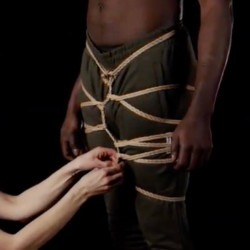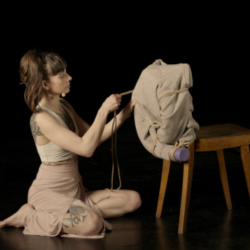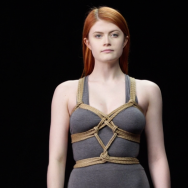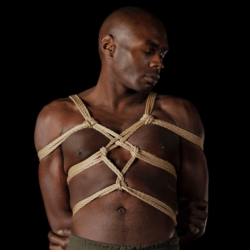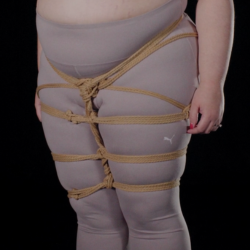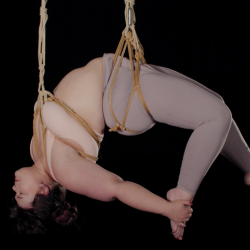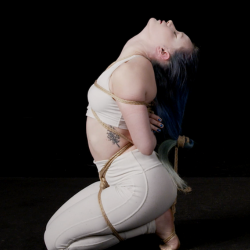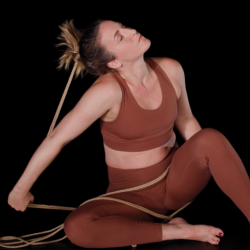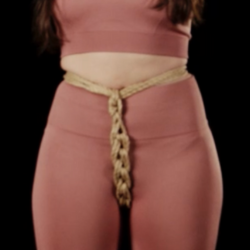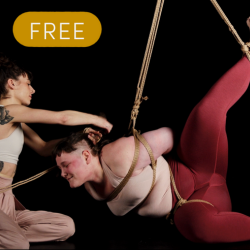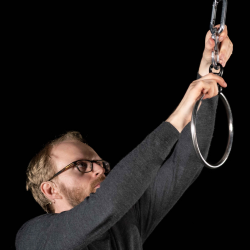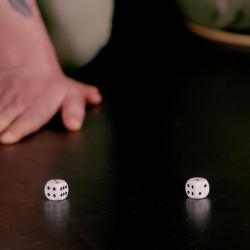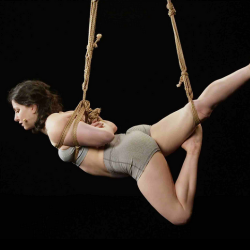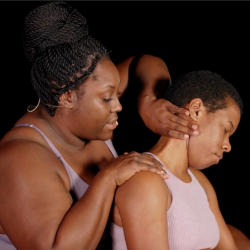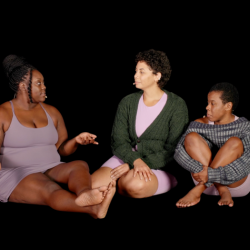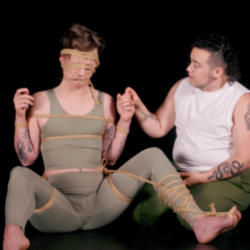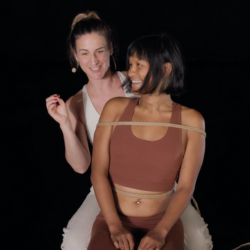EP 49
YANA
Good relationships are all about connection. Wren and Yana dive into the nuances of fulfilling intimacy, consent, and navigating dynamics in relationships. They discuss overcoming personal hang-ups, redefining pleasure, and the importance of open communication in both kink and vanilla spaces.

Yana Tallon-Hicks, LMFT (she/her), is a relationships therapist and sexuality writer + educator living in Western Massachusetts. Her work has specialized in queer, kinky, and non-monogamous relationships for over a decade. Her book Hot and Unbothered: How to think about, talk about, and have the sex you really want is available wherever you buy books.
Instagram: @the_vspot
[00:00:10] Wren Hello to all my guys, gals and non-binary pals. Welcome to the Shibari Study podcast. I'm your host, Wren. Shibari Study is an online learning resource offering video tutorials for beginners through advanced practitioners. Whether you're brand new to the world of Shibari and needing to learn the basics, or a seasoned rigger or rope bottom seeking inspiration to push your practice to new places, there's something for you at shibaristudy.com. Today, I'm talking to Yana Tallan Hicks. Yana goes by she/her pronouns. She's a relationships and (…) therapist. She works with queer, kinky, and non-monogamous clients. She's the author of Hot and Unbothered: How to Think about, Talk about, and Have the (…) You Really Want. It's available anywhere you buy books. Hello, Yana. How are you?
[00:01:01] Yana Tallan Hicks Good. How are you?
[00:01:02] Wren I am so well. Before this, you were telling me something rather salacious. And you said you really dislike two things. One of them, everyone here is going to be on the same page about. But the other one was a little bit wild. You said you really hate mayo, which I get, and yogurt, and you put those two together. You're like, I hate both of those.
[00:01:26] Yana Tallan Hicks Wait, why do you get mayo? But you don't get yogurt?
[00:01:29] Wren Because mayo is weird. It's a strange. It's a universally accepted thing. But yogurt? I feel like it has its place with some blueberries? Maybe some honey?
[00:01:42] Yana Tallan Hicks I mean, okay, mayo and yogurt have more similarities than differences. White gooey substance. And I know we are in a (…) positive space so we can all put together the ramifications this has for my (…) life. It can go nowhere near my mouth. I can't deal with it. It is like a... There's like a smell thing. It's a texture thing.
[00:02:10] Wren I have a follow up and I don't want to ask it because I know where everyone's brain is going to go. But are there other creamy white things that you cannot eat?
[00:02:22] Yana Tallan Hicks Yes. If my ice cream melts, I won't eat it anymore. A milkshake? No fucking way. I also will not drink milk.
[00:02:30] Wren Oh, same. I'm the same way about the ice cream. People are like, Oh, you got to, like, microwave it for a minute. No.
[00:02:35] Yana Tallan Hicks My God, it's so gross.
[00:02:37] Wren I do not like melted ice cream at all. I eat it so quickly because I don't want them to melt.
[00:02:44] Yana Tallan Hicks I had an ex that used to eat yogurt in the other room.
[00:02:51] Wren I feel like it's good that this person is an ex, because that need to eat yogurt so bad that you go to another room...
[00:02:59] Yana Tallan Hicks Yeah. Also, I have a four year old, so like yogurt is definitely a popular snack in my house. And it's, like, everywhere and –
[00:03:07] Wren It's everywhere?
[00:03:08] Yana Tallan Hicks Nothing tests my motherly love more than having to wipe up yogurt off my kid or, like, off the couch. It's – ugh, God.
[00:03:18] Wren Where did your kid find out about yogurt? Because if you're not bringing in a house, like, where did they see it?
[00:03:24] Yana Tallan Hicks From his dad. Yogurt, bad yogurt influence. It's so gross.
[00:03:33] Wren I have so many more questions. But Shibari Study is going to be very upset if I spend 20 minutes talking about how people find yogurt.
[00:03:42] Yana Tallan Hicks This is a yogurt podcast now.
[00:03:44] Wren I love it. Like we were saying, you're a relationships and (…) therapist. And I'd love to just start with the question of why having good (…) is important. Why is that a thing that is so key?
[00:03:59] Yana Tallan Hicks I mean, I don't think it's key for everybody. A lot of people don't care about (…), right? But for those of us that do care about (…), we probably want to be good at it. And we probably want to have enjoyable (…) experiences that are good. In my book, I do go off on like a chapter long tirade about good (…) and what it means. So like, you know, historically speaking, we've been told that there's like a harder, better, faster, stronger model of (…) that is the best possible model. But they're actually finding more and more that the quote unquote, good (…) is actually very relational and has a lot to do with your connection to the person and your trust of the person and your communication. So I think it's important for us to have (…) that feels like it's good (…) because it's connecting to us, and it feels worth the worth the effort, worth the quality of the experience. Also just on like a physiological level, it's like good for stress reduction. It's good for your, like, oxytocin and dopamine hits. It's good for all of that connect-y stuff. Yeah.
[00:05:12] Wren Why do we have such hangups around (…)? Why is it so difficult to have, quote unquote good (…)?
[00:05:20] Yana Tallan Hicks I mean, I think some of it is like mechanical and educational failures in the sense that [00:05:26]we don't get a lot of pleasure based (…) education if we do get (…) education at all. [3.9s] I do think the internet and things like that have made it a lot more possible to find pleasure education, but it is still something that we're lacking or we're not really sure where to look for it all the time. I don't know if you feel this way, but my Instagram feed is so hyper curated to (…) positive content at this point, I kind of assume that everyone's living that way, but it's just not true. You know, so many of the clients I talk to, they're still – not still, but they're in this place where, like, there hasn't been a lot of counterbalance to the narratives about (…) being shameful or bad or something to be kind of tolerated or like, should it be done for this reason or that reason or in this way or that way? And a lot of people end up feeling broken or damaged in some way, because what they like doesn't fit that mainstream view, or they can't really achieve the thing that they've been shown (…) is supposed to be, so like having an orgasm in under 30s from penetration alone type of stuff. People really internalize that. So I think part of it is like that mechanical, pleasure based (…) ed failure. And the other part of it can be, you know, negative experiences we've had or different things that we've kind of taken on that we've never questioned, which is what we tend to work on in therapy stuff.
[00:06:51] Wren You brought up we don't have a lot of pleasure based (…) ed. How can we have pleasure based (…) ed? How do you even start that kind of conversation?
[00:07:04] Yana Tallan Hicks Well, it's hard because federal funding like dictates a lot of what the (…) ed looks like that we get in schools, if we get (…) ed in school at all. The organization SEICUS -I believe it's spelled s-e-i-c-u-s? They release a report every year about the state of (…) education in schools, and it's pretty abysmal. It's not great. Not looking good. So, like, (…) ed at all, like, great. It's good for us to learn about safer (…). It's good for us to learn about preventing pregnancies that we aren't prepared for or don't want. But, you know, we're definitely not going to be learning about all the nerve endings in the clitoris or you know, how to have an orgasm just for funsies. We're going to learn a lot of like, pro creative, sort of like logistics. Which are often fear mongering and kind of like... I don't know. It's like we're checking a box. We're not really looking at the whole experience of it.
[00:07:59] Wren Yeah. And at least in America, it's a lot of stuff that's based on religion.
[00:08:04] Yana Tallan Hicks Yes, totally. And if you exist anywhere on the queer spectrum, you're probably not going to get a lot of tailor fit (…) education for you. I think, you know, there's a lot of independent (…) educators out there that are doing a lot of great work to, like, push back against that and provide more inclusive education. But we don't really have – there's not like that wide standing platform. I mean, if we like, have you seen the show (…) Education?
[00:08:33] Wren No, I haven't.
[00:08:33] Yana Tallan Hicks With Gillian Anderson!?
[00:08:35] Wren No, I should. I'm sorry.
[00:08:37] Yana Tallan Hicks What a babe.
[00:08:38] Wren I know...
[00:08:38] Yana Tallan Hicks But, you know, watching that series, I'm like, Oh, this is so awesome that, like, younger people have this available, you know. Like, so I'm definitely speaking from a place where, like, my (…) ed was more like, off the internet. I didn't really have a lot of internet when I was figuring (…) out. So, you know, I might be still in that dated mindset, but I do think we don't have a lot of standardized, communication based or pleasure based (…) ed still, and it fucks with people. You know, they end up in my office with this whole backdrop of (…) being this sort of like, shrouded mystery of like, what is actually supposed to be happening or how to get the things that they want, or even how to identify what you want. And that's still very much happening. But...
[00:09:25] Wren How do people even start figuring out what they want, (…)?
[00:09:31] Yana Tallan Hicks Yeah, it's so hard because so much of it is like guess and test, you know. Like there's like the psychological component of it where like, you know, you've seen that meme where the person's like scrolling past the kink and they're like, I'm not into that. And then they're like, Oh, hang on.
[00:09:45] Wren Yeah, yeah! Yeah!
[00:09:46] Yana Tallan Hicks Maybe I am? So we can have that little like instinctual psychological kind of ping. Which is also why I tell people to shop for their (…) toys, if they're kinkier, in person as much as possible. I mean, first of all, it's good to support your local businesses, but also you do have like a little bit of like a psychic intuition about the thing that you want. Like you feel a little zing to it, I think. But yeah. So some of it is like psychologically what's interesting to you. But then there's also this line between fantasy and reality where like, something might be super fun to fantasize about. And then when you realistically try to pull it off, you're like, Oh, actually, like, this suspension really hurts or like in a bad way, or like, it's not possible for me to do this thing that I fantasize about. So some of it is guess and test in reality. You know, I'm sure people have seen the little (…) tests that float around FL a lot, there's a really extensive yes no maybe list in my book. There's also yes no maybe lists all over the internet, which are just like long checklist of (…) acts and things to try. But a lot of it is like figuring it out. And I think part of that is having a safe space to do that. So, like, are your partners okay with you being like, I want to try x, y, z, and maybe it'll go well and maybe it won't. And if it doesn't, we'll try something else. And I don't think people have that flexibility. If (…) is like a performance, then we can't really experiment with it.
[00:11:16] Wren Yeah, the concept of having (…) and essentially doing it to perform for your partner versus doing it for yourself is really interesting.
[00:11:27] Yana Tallan Hicks Yeah, I also like doing it for yourself - I mean, I know what you mean - but like, doing it for yourself to a certain extent is very insular or like isolating. Doing it for your partner is very like performative, also isolating and kind of disingenuous. To me, when I talk to my clients about this stuff, I'm like, this is a collaborative project. Like you're both showing up to do this thing together, and the goal is for it to feel good and to have fun, you know, whatever. Whatever your goals are. But essentially we're here to have fun and feel good. So like, however the two of you decide to do that, that works for the two of you is great.
[00:12:06] Wren It sounds like what you're explaining is something that is premeditated, planned, negotiated, obviously negotiated, but negotiated in the sense of we're going to set out to achieve these goals in these experiences.
[00:12:22] Yana Tallan Hicks Yeah. And I also think that as partners get to know each other better, that premeditation part kind of not falls off, but you kind of get more of an intuitive balance around what you know is within bounds and how – what you know needs to be talked about more before you try it. You kind of get like this track record around what is possible. But yeah, I do think people having this safety to feel good in their own bodies while being witnessed by somebody else is really hard. Like we think about, like, what do I look like? Do I sound silly? Like, do – you know, whatever. Am I going to fart? Like we get so self-conscious about these things. And if we have the safe container, then we kind of get to let that go a little bit and get a little bit more in our bodies. And that's – it sounds so simple on paper, but it's so hard to get to that place when you think about all the things that might work against that situation. Like whether it be body image or trauma or what we've been told (…) is supposed to be or worrying about what your partner thinks or some conflict you all got in over dishes last week that wasn't resolved. All this stuff kind of factors in and yeah, I could say more, but...
[00:13:37] Wren You said so much and my little writing hand is just scribbling away things that I want to ask about. You're saying so many amazing things. My mind immediately goes to [00:13:48]what can a couple do to reset in a relationship? [4.6s] Obviously, we get stuck in our ways. There's baggage that happens. There's preconceived notions about what people want and don't want and saying, Hey, we need a reset point, is really scary and hard to do.
[00:14:07] Yana Tallan Hicks Yeah, I think for some people, like, I see a lot of long term partners who have either gotten kind of stuck in a rut, or their desire for (…) is not like aligning anymore. And it's important for people to realize that. It's super normal for like the early stages of a relationship, to feel like your desires are always kind of magically synced up. Right? It's like we want to do the same stuff at the same time in the same way all the time, right? That's like a very normal beginner relationship place. And it's temporary because our bodies and brains and like all the oxytocin and the dopamine and the bonding hormones and elements phase, it's not a sustainable place. Like I think a lot of people have been in those early days where you're like, I would rather have (…) until 4 a.m. and actually get a full night's sleep. That's not really going to be something you can do for the rest of time. So when you're kind of clicking into this, like I call it old relationship energy. You know, you're gonna to click into that mode where, like, it is important to have somebody you can, like, slug around on the couch with or like, you know, talk about, I don't know, gross stuff, like, whatever. It's good to have those worn in pair of socks type of partner. But it can be a desire crusher sometimes for people to get into that mode. So like it's important that when we're talking to those kind of partners, but that mismatch becomes more apparent that they know that it's normal. They know that that early day relationship fervor probably is not going to come back, and it's not going to come back without some, like serious work and that they can work on their (…) life on purpose instead of just waiting for it to, like, magically become synergistic again, which I feel like people wait, and to to do (…) on purpose, right? So like whether that's scheduling it or like a lot of long term partners, they got to excavate some (…) that went down a couple of years ago that shifted their relational dynamic. You know, people think that (…) is sort of this like annex to their real life, but it's actually part of their whole life. So what happened around the time (…) started dropping off? Does that need to be addressed? And then working together to solve the mismatch is really important, because I think people get into the zone where they're like, well, I'm low libido or like, I just want (…) too much. And those are such like permanent ways of talking about yourself rather than looking at how do we interact in this (…) dynamic together that's creating this thing that we want to change, and how can we work together to change it?
[00:16:51] Wren Yeah. You mentioned self-talk in it and – because people do do that, they say I just have a low libido. I just want (…) too much. What are some ways that we can change that self-talk and how important is it to do that?
[00:17:06] Yana Tallan Hicks Yeah, I think so. In therapy this is called externalizing the problem. And the idea with externalizing the problem. It's a narrative therapy technique for those who are therapy nerds like myself. Is that we can tell ourselves these narratives, right? Like I'm low libido. I just don't want (…) that much. Or like, I'm super high libido. Like, my partner's just always going to reject me. I just, like, need to chill out and figure out a different way, whatever. We tell ourselves these things. And the thing about that self-talk narrative is we end up taking actions that that prove it to us. Right? So like, we take actions lot of the time subconsciously to prove my story, that I'm low libido.
[00:17:47] Wren Yeah. Do you think that there's a safety in saying, This is my story, and I'm going to do everything I can to make it come true? Is that why people do it?
[00:17:55] Yana Tallan Hicks Maybe. Yeah, I don't know. I mean, I think there is like a predictability to it. I think that a lot of the time it's hard for people to think about like, how do I explain this? Like, I feel like when you're in a long term partnership, you sort of get used to your partner being the way your partner is. And if they were to change suddenly, it would be sort of shocking. And so a lot of the time I tell my clients, like, you need to give your partner and yourself permission to just like, try something on. Even if it's like out of character, like maybe it's out of character for me to, like, dress up in a full set lingerie, and seduce my person. But like, I can't let it being out of character be the block.
[00:18:39] Wren The uncomfortability in all situations leads to growth, and I've heard it talked about a lot outside of (…), but within (…) it's never really talked about. And I haven't thought about it like that. Like you have to try new things to grow (…) with your partner.
[00:18:58] Yana Tallan Hicks Yeah. And I think sometimes, like, you know, I think my job as a (…) therapist is very legit. I don't think it's just, like, easy or whatever, but sometimes if I really distill my, my work, I'm like, all I'm doing is giving people a space to talk about (…) in an intentional way. And sometimes I'm like, that's all I'm doing. Like, what is the point of me? This is like, so easy, so simple, so silly. But like, I think it's like we get – we don't, we don't have a lot of like, great examples of how to talk about (…) in an intentional way, or treat a (…) interaction like a learning experience or an experiment. We're just kind of are like fumbling through and like hoping something's going to shift. And like the thing that I think is really great about kinksters in general is they're so good at like, externalizing that part of things and making sure you're talking like – you can't really fake it through a scene. Like you really need to, like, show up and have a plan and know what you're doing to a certain extent, which I think is awesome, but I think a lot of people don't have the space to be like, Okay, let's troubleshoot this (…) thing.
[00:20:10] Wren Do you see a correlation between kinksters and non-kinksters. Are kinksters better at having fulfilling (…) relationships or is there no correlation between kink and having successful relationships with their partners?
[00:20:26] Yana Tallan Hicks I wouldn't say it's better. I think it's more normalized in kink communities to talk about stuff in a way that is, I don't know, on purpose or like there's some sort of structure, right? Like with there some structure to be like, okay, you need to plan your scene. Okay. What do you need for your scene? How do we like, obtain everyone's consent in a way that makes sense? Okay. How is aftercare going to go? Like there's kind of this whole like "should" quality to it. And I think in a vanilla, more vanilla space there's like less of that. The shoulds look different in a way that I think is more unhelpful, right? So it's like the shoulds become sort of like, don't talk about (…). Wait for the spark to kind of align. Like don't criticize anybody or give any feedback. And I think in the kink space it's like, yes, if something went awry, please tell me, like, I want to do better next time. That's all kind of baked in. And I think where we get in the danger zone is in that kind of gray area. Haha, 50 shades of Gray. That was a good accidental joke.
[00:21:31] Wren I love it.
[00:21:33] Yana Tallan Hicks The danger zone is kind of when, like, there's, like a murkiness where people are on that learning curve from vanilla to kink, if that's even like a correct spectrum anymore. But, you know, there's like... There is that learning curve of learning how to talk about (…) very clearly and openly and on purpose, and even like, write stuff down or like consult a list, right? Like we're not taught how to do that or like vetting a partner.
[00:21:57] Wren It's being super intentional about what you like. You can't – like you said earlier, you can't fake that you're really into the CBT going on, and it's like you got to be enthusiastically into whatever is happening. I have a general question. I'm not sure if you have thoughts on this, but it's just something I've observed. It feels like all the queer people I know, all the trans people I know, are also into a non-monogamous relationship container. They're also involved with kink in some way. There's the joke about the Venn diagram just being a circle with all the scenes of people. Why do you think that is? And obviously, I understand that I'm deep in the kink scene and the queer scene. So that's what I'm seeing and that's what I'm choosing to see. But I feel as if maybe it is sort of a real thing.
[00:22:52] Yana Tallan Hicks Yeah, I don't know. I'd be interested to see the real numbers like that. Because, you know, I also live in a community that's very like, you know, you can't throw a (…) out the window without smacking a non-monogamous queer person with it or whatever. But I do think from what I hear, I hear from a lot of queer people more recently, there's kind of this, like, boomerang effect of like, you know, last monogamous lesbian ever type of feeling where it's kind of like, Okay, is it okay if I'm monogamous? Like, what's happening? Or just like, you know, I'm not into kink. Like, is that okay? You know, like, just like people being like, am I – the kind of a whole, like, queer enough thing? Comes through I think with the non-monogamy/monogamy, kinky/non kinky whatever. And you know, I tell people a lot like especially with kink, like kink is really in the eye of the beholder. You know, like I've had clients who feel like they're really edgy because they like, use a blindfold they got at Spencer's. And I have clients who feel like they're really vanilla because all they did was breath play, you know. Like, yeah, I think there is definitely like, a perception versus reality thing going on.
[00:24:04] Wren Yeah. Anytime you're judging yourself off of some fake thing that you're just seeing while scrolling Instagram, you're going to fail. You're not going to do something authentic for yourself and your partner.
[00:24:17] Yana Tallan Hicks But I do think there is like a (…) liberation peace to queerness and kink that kind of – and non-monogamy that sort of all melds together. Like, I think people who are really interested or really feel like they can be authentically themselves in like, quote unquote alternative spaces. Those spaces can mush together. And that doesn't mean like you have to hit all three or whatever. But I do think there is a commonality there. And I think a lot of my, like, straight cis couples who are interested in non-monogamy or are interested in kink, they do have a high learning curve because they're not used to being kind of outside of this dominant narrative of what a relationship looks like. It's a lot of that is part of that permission seeking is mostly what they're kind of working on or just being okay with what they're trying. And sometimes I think the queer community is like, yeah, fuck this. I've been doing this forever.
[00:25:12] Wren Yeah, exactly. Yeah. The learning curve is hard because it wasn't until I started... I dunno, like, being queer, I guess, and being kinky where you have to make so many calls day to day. You have to make so many hard talks. And before that, I never had to make those kinds of talks or decisions or confrontations.
[00:25:36] Yana Tallan Hicks Yeah, I will say too, like, this is kind of rewinding a little bit, but something that I'm noticing with kinky clients or kinky partners is the pitfall that I'm seeing more recently is like... Feeling like they should have it all figured out. Like they should know how to have a consent negotiation perfectly. They should know how to talk about (…) without shame. They shouldn't have any hang-ups about the kinks that they're into. And that's just not realistic. And I call it like the Consent Geniuses layer where it's like, yeah, like we're, it's so awesome that we're holding our communities to to these higher standards of interacting around (…). That's great. But I think on an individual level, feeling the pressure to... Like never make mistakes or even convincing yourself that you're above all of that shame stuff. That is a dangerous place to be because we need to be able to look at it still.
[00:26:36] Wren Yeah. Everyone will make mistakes. What we do is insane. When those mistakes are made, do you have any thoughts on how they should be addressed?
[00:26:51] Yana Tallan Hicks I mean, this is hard because [00:26:54]not all mistakes are created equal. Not all intentions are created equal. [5.8s] Like, I think there does need to be a little more nuance around how each individual person is handled in these things. So I don't think I have like a clear cut formula.
[00:27:13] Wren I did ask an impossible question.
[00:27:16] Yana Tallan Hicks No, it's okay. I mean, but it's hard. Like, it's interesting being someone who talks about (…) and kink and all that stuff openly in a general way. Like on my Instagram or when I'm doing a workshop. I have to generalize it all. But when I'm like one on one or two on one, or whatever in my office, I can individually address people's (…). So it's like, let's say somebody like, you know, made some mistake during a scene that they didn't even realize they did. And then after the fact, their partner was like, hey, this (…) went down. I'm not okay with it. We can work individually on that in a way that works for those people. Instead of this general idea of like, okay, let me tell you exactly what should happen, right? Like, I don't know if I have the general.
[00:27:59] Wren I think it's amazing that you said that, though, because you're perfectly right. There is no one size fits all. [00:28:07]Intentions are different, mistakes are different, and there needs to be nuance. [3.6s] It's just impossible to have nuance on Instagram. It's impossible to have nuance in the town square of social media. I'm going back a while in this conversation, but you said something that really resonated with me, and I want to dig into a little bit more. Earlier, you were talking about going to (…) shops and touching things, and how your intuition will send a little zap inside of you and you'll feel a zing. Your gut will tell you something like, this is the thing that I should interact with, and I would be curious what role the gut or the intuition plays in (…) or kink or things like that.
[00:28:55] Yana Tallan Hicks Yeah, I am definitely a very like logic minded cognitive type of therapist. So like if my clients come in and they're like really wanting to do somatic work or like – I have never once asked a client, like, where do you feel that in your body? It's just like, which to me, honestly, this is a side note, but that to me makes me think I need to do somatic therapy.
[00:29:20] Wren Yeah, I'd be like, I don't know.
[00:29:22] Yana Tallan Hicks Yeah, there's something about that repellent to me that I need to figure out.
[00:29:27] Wren Oh, that's interesting because I feel the same repellent, right? Like I wanted to make a joke immediately. Maybe I need to dig into this.
[00:29:35] Yana Tallan Hicks Yeah. So to me, I'm like, that means I should do somatic therapy. But being cognitive like that, I do, I do try. I've been trying more recently to listen to my gut more. I'm also somebody who has a lifelong anxiety disorder. So it's always like, is my gut like my amazing psychic intuition, or is my gut like my mental illness? Right? Like what if...
[00:30:04] Wren Did I leave the oven on?
[00:30:06] Yana Tallan Hicks Yeah, totally. Or like, maybe I did leave it on and I'm just really in touch with it.
[00:30:11] Wren I love it.
[00:30:12] Yana Tallan Hicks But I think I think when it comes to (…) and (…), like, (…) is such a body based experience for so many people that I feel like your body does register things maybe before your brain does. And so for me, like if it's like dating or (…) or whatever, I'm trying to get more on line with, just like, okay, if I just feel off around this person, can I listen to it? More than what my brain tells me, because my brain – I will try to talk myself out of all kinds of things. But what if I just was like, this just feels off, and I think other people are better at that than I am or some other people are. But I think when it comes to like (…) toy shopping or even like clothing shopping for me, I find and I used to work in (…) toy shops and I would tell this to people also, like usually the first thing you touch in the shop that you're gravitate towards is going to be the last thing you circle back to. And so like there's definitely been times that it's like clothing, (…) toys, whatever. If I'm still thinking about it after I left the store and I didn't buy it, then I probably want to go back and buy it.
[00:31:29] Wren This is just my own interpretation of these things. I look at this as kind of a precursor to negotiations and consent things. There's a feeling. There's intuition. And if that thing inside is telling you, Hey, don't do this. Or, Hey this may be a little bit goofy. This person saying some weird (…). You like, have to listen to that and then go into consent talks and negotiations and things like that. But I feel like so many people don't follow that initial spark, or they're painting that spark to fit the narrative that they want.
[00:32:12] Yana Tallan Hicks Yeah. And I think, you know, painting the spark to fit what you want I think kind of gets into like the scarcity zone or the scarcity mentality of things where it's like, Well, this is the only rope top within like a 50 mile radius of me. So... I want, I want this to work out. Right. And I think like when people are having consent negotiations with people, especially if they don't know them, it is important to think about how you felt when you were around them and how you feel after you leave, how you feel like a day later. Like, I think having space and time between things is really important. Instead of just like, Cool, we're going to be at this place. All right, let's hammer out some negotiations. Cool. Now we're doing it. Like, I think having a little time to let your body catch up or give you Intel that you didn't have at the time can be really helpful.
[00:33:01] Wren You brought up a really good point where it's letting your body come up to speed, letting your body process everything that happens.
[00:33:09] Yana Tallan Hicks If you're somebody like me who is working on getting more in touch with their gut, their intuition, slowing down a little bit, can be helpful. Just like to help yourself get more in touch. I also think it's confusing, like the line between excitement and anxiety is so thin. Like they're both states of arousal. So like if you're headed into this situation where like it's an arousing situation and I don't just mean like (…), it's like your whole body and mind is like up on this thing. That's a hard place to make decisions from.
[00:33:39] Wren I haven't thought about it. And after this, I'm gonna pay for my therapy session, I promise. But I haven't thought about it like this where you are training your mind and your body, your nervous system, to be in this heightened situation. And it's scary as fuck in the beginning. But then you figure it out and you get more comfortable. And if you're negotiating with somebody that is already cool as a cucumber in those situations, you're at a disadvantage in a way, and there's a huge power imbalance there.
[00:34:09] Yana Tallan Hicks Yeah. I mean I think anytime we're talking about any sort of kink interaction ever, we're talking about a bajillion power imbalances and balances that we need to figure out. And I think that's also part of the thrill, right? Is that like there is pow-- we are fucking with power. And so I think that it's hard to again, like, where's the line? And I don't know if I even have the answer, but it's like, where is the line between like power fuckery that feels... Like good and interesting and power fuckery that you're like ah (…) like this is not really what I wanted to do or like, this isn't what I, I don't know, like, it's hard because I think, like, on one level, there's a lot of power imbalance stuff that feels super cut and dry, right? Like, if I'm not able to have a conversation with you or not have enough information to consent to this thing like that feels very cut and dry to me. But then there's all these nuances right where it's like, I can push myself as a bottom to a place where maybe I actually wasn't ready to push myself. And is that because I'm wrapped up in the moment and I want to be good and like the best at what I do, right? And like, where is that coming from? I mean, you could just, like, go down the rabbit hole forever.
[00:35:22] Wren Yeah. There is a very common phrase in the kink world, and it might not be so popular anymore, but it definitely was where people thought that they could heal others with their kink. And people thought of kink as therapy. And now we're starting to move past that. But I would be curious to dive into what furthering that conversation looks like. I think most people understand that kink is not therapy, and you cannot be healed and, and work through things in kink. But kink is a very... It's heart opening activity. But where is that line I guess?
[00:36:02] Yana Tallan Hicks If anyone is telling you they're going to heal you, you're in danger. That's like – not – like myself included. Like, even as a therapist, I'm not going to be out here like I can heal you. I can hold a container to help you figure out new tools for healing for yourself. But I don't think that it's like, you know, here's this thing. I'm going to change your life or whatever. I think that kink can, can be used in conjunction with therapy to help people do therapeutic things, such as learning how to reestablish boundaries or identify safe people, or play with these parts of themselves who want to give up control or take control or like, you know, there's so much out there about attachment theory now, it's very pop psychology, but attachment and kink, I think, have a lot of really interesting overlaps just in terms of like, how do you lead into a dynamic? How do you give trust? How do you show people that you're trustworthy? And like, what does it mean to really intentionally play out these dynamics where somebody has power and somebody else is quote unquote, giving power, even though we all know bottoms have the most power? Yeah. But, you know, having that intentional dynamic be put in place can really tap into people's psychology of their history and their trauma, pretending that that exists in a vacuum is not real either. So I think like to me, that's even, why it's even more important for there to be more out kink friendly therapists is because if you have a client that's coming in and they want to talk about their trauma, or they want to talk about attachment or relationships, and they happen to have like a very robust kink practice that is good information to have and to know and to work with. It doesn't have to be like, Oh, you're traumatized. And therefore that's why you're kinky. Like, no, no one's like walking around being like, Oh no, I'm vanilla. What trauma in my history like made me this way. So basically when you go in with a therapist, if they're so hyperfixated on your kink, like so hyperfixated on it to a place that you aren't, then like, that's probably not going to help you. But I think that if you're able to talk about attachment relationships and trauma in the context of your kink stuff and vice versa, cool. Like that's rich therapy fodder, but I don't think it's going to be like, Oh, I, you know, I'm in this rope dynamic and now I'm healed. Like, I just think if someone's like, I'm going to heal you. But it's like, Okay, good day. And like vice versa if someone's like, Please heal me, also, good day.
[00:38:42] Wren Yeah, yeah. God.
[00:38:45] Yana Tallan Hicks But yeah, I mean, I think it's interesting, it's interesting to think about. And I don't think everybody does feel like deeply, psychologically invested in their kinks. Some people just like want a nice bruise and that's fine too.
[00:38:56] Wren Yeah. I could keep talking to you for another hour. I want to do another podcast and dig into a bunch of other things I have. I think my final question is, in the beginning of this, you brought up Gillian Anderson, and I'm just curious, have you had anybody come in that said that she has made them gay? Is that a common thing throughout patients you see?
[00:39:17] Yes. All of them.
[00:39:24] Wren Where can people find you if they want to work with you?
[00:39:26] Yana Tallan Hicks So I have a website. It's yanatallanhicks.com, which is my name, .com. I have an Instagram which is the_vspot. V like t vulva, and I regularly post things on that Instagram about working with me. I do some like, little streaming webinars. I do one off coaching sessions. I can do ongoing therapy in Vermont and Florida, and pretty soon New Hampshire. Hopefully. Fingers crossed. And yeah, you can get my book wherever, which is probably the most efficient and cost effective way to work with me. I pretty much put everything I know in there.
[00:40:03] Wren I love it.
[00:40:04] Yana Tallan Hicks Yeah. There's worksheets.
[00:40:06] Wren Amazing.


